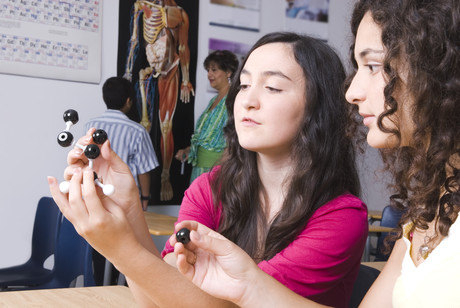Girls' interest in STEM is in decline, says report

Victorian researchers have found that the number of Australian girls taking part in science, technology, engineering and mathematics (STEM) subjects has been declining at an alarming rate, causing Australia to fall behind compared with other developed countries.
The ‘Girls’ Future — Our Future’ report was developed by researchers from Deakin University and the University of Melbourne for the Invergowrie Foundation, a public charitable trust whose primary focus is to advance the education of girls and women within Victoria. The report found that the participation rates of girls in STEM — particularly in physics and advanced mathematics — has declined since the 1990s.
“This trend is similar in many Western countries, but particularly prominent in Australia,” said Dr Linda Hobbs, a researcher at Deakin’s School of Education.
“There is a resulting concern with Australia’s performance in the STEM disciplines compared with other countries, both in the research and development sector, and in education.”
The report found that only 5.9% of female year 12 students take up a physics unit, compared with 21% of males. Other discrepancies can be seen in advanced maths (6.2%, 11.5% male), intermediate maths (20.6%, 28.4% male) and chemistry (16.5% female, 19.2% male).
“The low number of girls in physics and advanced mathematics is particularly problematic, because these are considered the ‘enabling’ STEM subjects — those subjects provide access to tertiary-level science and engineering courses and provide much greater job opportunities after graduation,” Dr Hobbs said.
Russell Tytler, Alfred Deakin Professor and Chair In Science Education, said researchers found a key factor that impacted girls’ engagement in STEM was the “deeply embedded” gender bias in cultural expectations, which “continues to impact negatively on the formation of girls’ attitudes, identity and self-efficacy beliefs with respect to STEM”.
“Girls and boys at preschool age, all the way through to primary and secondary school, are exposed to different gendered experiences by their parents, carers and teachers,” Professor Tytler said.
“What it is to be ‘a girl’ and how girls are encouraged to be part of the world is constrained and directed by cultural stereotyping and experiences from an early age, and children as young as six have been shown to associate science with males in part because of the pervasive alignment of STEM with masculinity,” he said. Dr Hobbs added that this “identity gap” was particularly striking among girls from ethnic minority or lower socioeconomic status backgrounds.
“What we need is a durable, concerted effort with parents, teachers and career advisors all working together to start early and assist girls in developing positive concepts of themselves in STEM subjects, and to continue to do so in a sustained way,” Dr Hobbs said.
Report co-author Professor Jan van Driel, from the University of Melbourne, said parents, carers, teachers and career advisors should learn to avoid the stereotyping of girls’ interests and abilities in STEM, stating, “They should work together to encourage girls’ participation in STEM subjects.”
Other potential avenues include: addressing unconscious biases and teachers’ ability to teach STEM for all students; supportive educational experiences; quality advice on the diversity of STEM-based career possibilities; and engaging girls with carefully selected role models through project work, mentoring or industry placement.
“If they are able to interact with and relate to people already in the field, they are able to see their own career possibilities,” Dr Hobbs said.
Appropriately, it was separately announced this week that several prominent Australian businesswomen, scientists and technologists have signed up to become mentors for the Superstars of STEM program — an initiative to create a critical mass of strong, visible, relatable and public female role models in STEM.
The program is designed to equip participants with advanced communication skills, so they can become role models for the next generation of girls and young women. Mentors include the Hon Terri Butler MP; former Catalyst presenter Dr Jonica Newby; University of Adelaide Vice-Chancellor Professor Tanya Munro; and many more leaders in business, science, technology, research and the media.
Science & Technology Australia (STA) President Professor Emma Johnston, a mentor herself, said the breadth of experience amongst the mentors is outstanding.
“We have gathered together an extremely impressive group of women, and I am proud to see so many decision-makers and influencers in Australian business, technology, science, research and the media taking part,” Professor Johnston said.
“Linking participants with women who are already public figures, we intend for them to provide our Superstars with insights into how they can become public advocates for their science, too.”
Professor Johnston said she wanted to bust the myth that the typical scientist was an old man in a lab coat, noting, “Many of the mentors involved would have faced similar perceptions in their own careers, and I’m excited to show Australians that your typical scientist is harder to pinpoint — it could be someone just like you.
“We hope that by seeing these inspiring women and the very different work they do, many more young women and girls will believe they can be scientists too and pursue a rewarding career in STEM.”
The first 30 Superstars of STEM were selected in July from more than 350 applicants from around Australia, and have received several months of training and support so far. For more information on the program, visit the STA website.
Global competition targets 'undruggable' cancer protein
A new global competition offering over US$500,000 in prizes aims to spur drug discovery...
SMi Systems appoints Dr Ankur Mutreja as Senior Advisor
Mutreja was previously Head of Global South Partnerships at CEPI, where he was responsible for...
STA announces new Superstars of STEM, next President
Science & Technology Australia (STA) has announced the country's next Superstars of STEM,...




